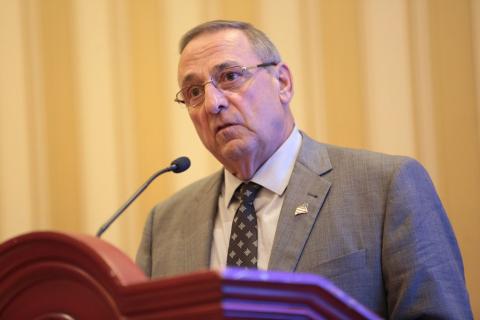In his weekly public address Wednesday, Maine Governor Paul LePage took time to talk about the upcoming June 12 primary elections, specifically about his objection to Clean Elections funding and -- interestingly enough -- his support for minority rule.
"Another issue to consider for next Tuesday is the Ranked Choice Voting referendum. This system tries to ensure that office-holders are elected with a majority, meaning 50-percent-plus-one-vote, in races with three or more candidates. Ranked Choice Voting works on the assumption that there is something special about being elected with a majority rather than a plurality." says LePage.
Something special? You mean like ensuring majority rule -- one of the basic principles of a democratic process?
RELATED ARTICLE: Judge Tosses Maine GOP’s Complaint Against Ranked Choice Voting
LePage invokes Abraham Lincoln to make his case.
"The greatest president we’ve had in our nation’s history, Abraham Lincoln, was elected with less than 40 percent of the popular vote in a four-way race in 1860. I think that plurality worked out just fine," says LePage.
There are a couple of things wrong with this statement.
First, the president isn't elected by popular vote. The president is elected by the Electoral College. We had this whole discussion in 2016 when Donald Trump won the election despite losing the popular vote.
The Electoral College system requires a majority victory. Lincoln's three opponents combined took 123 electoral votes. He took 180. Lincoln won with a majority.
Further, Lincoln won a majority in states sufficient enough to win his Electoral College majority.
But we're not done with Lincoln just yet.
Abraham Lincoln won the Republican nomination on the third ballot at the 1860 GOP Convention with a majority vote. If the Republican Party elected by plurality, US Senator William H. Seward would have been the nominee, not Lincoln. (Seward took 173½ votes to Lincoln's 102 on the first ballot, with 233 needed to win the nomination.)
LePage in short says minority rule is a-okay: "A plurality of votes is sufficient. Ranked Choice Voting overcomplicates a simple process: one person, one vote."
There is not much to ranked choice voting, really. You go to the polls, rank candidates in order of preference, cast your ballot. Then, an automatic system of runoffs goes into effect if no candidate gets a majority.
https://www.facebook.com/IVN/videos/10154645374402465/
In other words, it's one or more additional rounds of runoffs without spending extra time, money, or resources on runoff elections that will have much smaller turnout. And only the highest-ranked choice at the end of the process counts. So, it is still one person, one vote.
"If the voters do want a winner with a majority, rather than use a complicated mathematical algorithm, we could amend the Constitution to allow a runoff election," says LePage.
My initial reaction was, maybe the governor doesn't fully understand how ranked choice voting works. 😂 But seriously, what he is suggesting again is extra time, money, resources on the part of not only the state, but voters, to conduct another election. And, the winner would not be selected when the most voters participate.
Ranked choice is designed to conduct instant runoffs to make the process more efficient and ensure the winner is decided by a majority when the most voters participate.
Maine voters will decide the future of the state's voter-approved ranked choice voting law in the primary elections on June 12. Voters will be allowed to choose between a Republican and Democratic ballot. The referendum to protect ranked choice voting (Question 1) will appear on both ballots while voters use ranked choice voting for state, US House, and US Senate elections.
Photo Credit: Gage Skidmore
